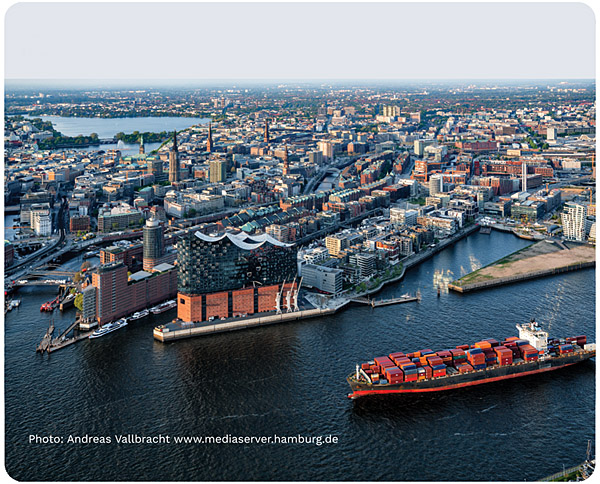An interregional cooperation project improving low-carbon economy policies. Ports are a consistent and important economic factor for the regions they are in, while their activities can cause significant negative environmental impacts – e.g., inefficient road traffic in port areas causing CO2 emissions.
The Interreg Europe project SMOOTH PORTS, led by the City of Hamburg, with a budget of €1,139,601.00 (€951,310.85 European Regional Development Fund [ERDF]), aims to develop solutions to reduce CO2 emissions in ports. To achieve this, SMOOTH PORTS focuses on developing efficient procedures and for the clearance of goods in ports, information-communicationstechnology solutions for different port activities, and alternative fuels for road traffic.
From Good Practices to Action Plans
Ten different good practices on how CO2 emissions in ports can be reduced were identified. As a result, Concrete Action Plans for the participating ports were formulated.
SMOOTH PORTS has helped to foster discussion on how to reduce these emissions. Each port follows a different approach, according to the local situation as well as the different port activities. The Hamburg Action Plan aims to incorporate the project into the new operational programme for the ERDF funding period 2021- 2027, within the funding area 'sustainable logistics'.
When adopting Hamburg's ERDF operational programme and linking it to the project, a funding basis for logistics projects reducing CO2 emissions in ports will be established. Like some of its project partners, one-stop-shop solutions for the Port of Hamburg have also been discussed.
The Action Plan of Livorno will pave the way to a cross border IT-tool for efficient, competitive, and sustainable management of freight flows, within the framework of the Italy-France Maritime programme.
In addition, the Nantes Saint-Nazaire Action Plan will focus mainly on promoting alternative fuels in the port area in the public Natural Gas Vehicle station of Montoir de Bretagne. Furthermore, the Action Plan foresees the establishment of a working group to analyse operationaland regulatory processes of the Service d’inspection vétérinaire et phytosanitaire aux frontières (SIVEP). The aim is to improve and optimise operational processes and facilitate the transit of goods.
A monitoring detector truck to assess the pollution level will be installed in Monfalcone. The priority is to ensure greater services for citizens, based on better environmental conditions by introducing innovative sustainable mobility technologies and creating the infrastructure networks for recharging electric vehicles. Furthermore, Monfalcone will obtain the installation of On-Shore-Power- Supply in the port. It will provide an electric ship to shore connection to provide for a passenger ship and/or a merchant ship.
Varna's Action Plan will include a feasibility study for the development of an automated “integrated information processing system” between the port operator and the Customs Agency. Moreover, the agenda includes the development and implementation of a system for electronic information exchange; the "Port Community System".
SMOOTH PORTS is now entering phase 2, which involves the implementation of the Action Plans

More information
www.interregeurope.eu/smoothports